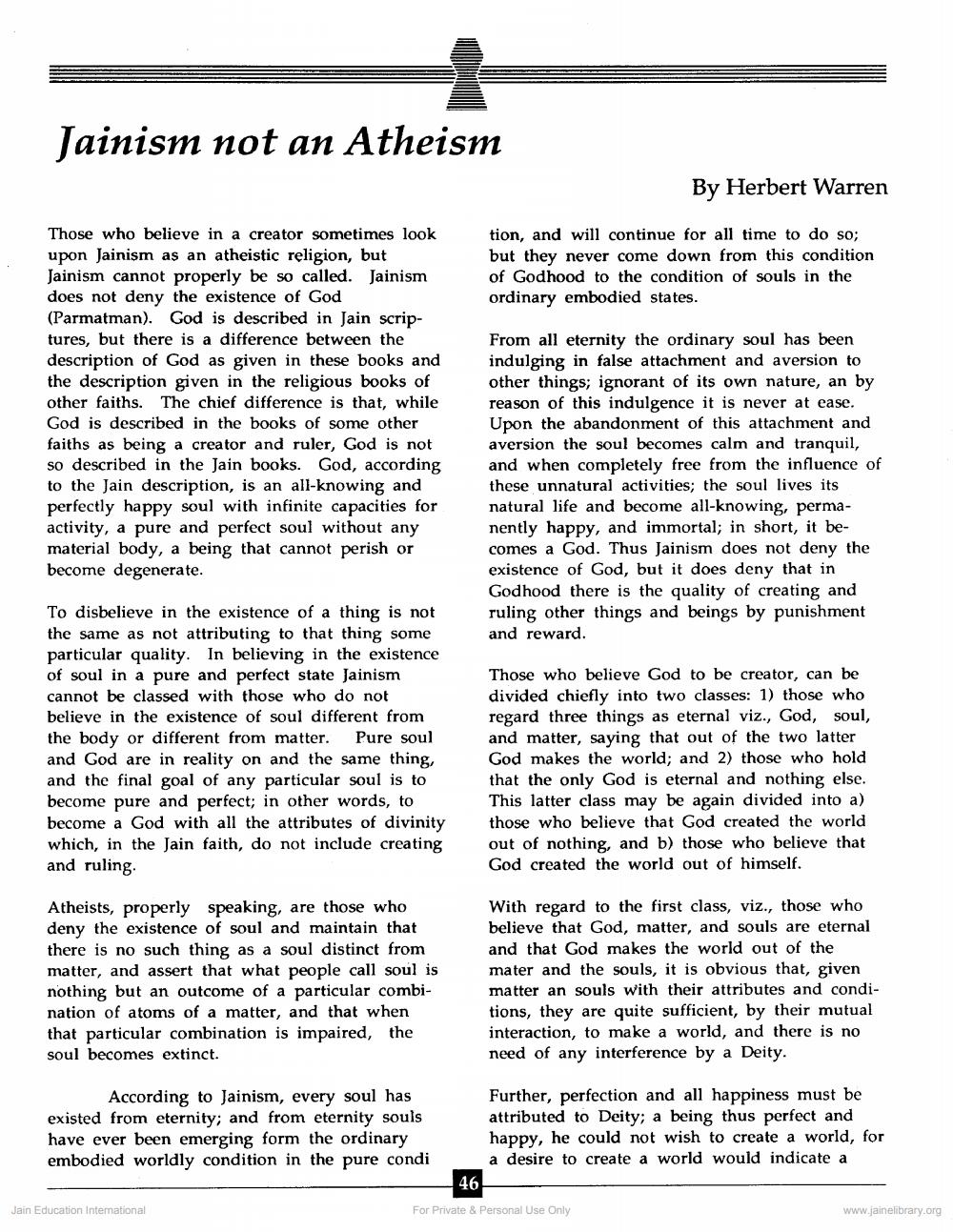________________
Jainism not an Atheism
Those who believe in a creator sometimes look upon Jainism as an atheistic religion, but Jainism cannot properly be so called. Jainism does not deny the existence of God (Parmatman). God is described in Jain scriptures, but there is a difference between the description of God as given in these books and the description given in the religious books of other faiths. The chief difference is that, while God is described in the books of some other faiths as being a creator and ruler, God is not so described in the Jain books. God, according to the Jain description, is an all-knowing and perfectly happy soul with infinite capacities for activity, a pure and perfect soul without any material body, a being that cannot perish or become degenerate.
To disbelieve in the existence of a thing is not the same as not attributing to that thing some particular quality. In believing in the existence of soul in a pure and perfect state Jainism cannot be classed with those who do not believe in the existence of soul different from the body or different from matter. Pure soul and God are in reality on and the same thing, and the final goal of any particular soul is to become pure and perfect; in other words, to become a God with all the attributes of divinity which, in the Jain faith, do not include creating and ruling.
Atheists, properly speaking, are those who deny the existence of soul and maintain that there is no such thing as a soul distinct from matter, and assert that what people call soul is nothing but an outcome of a particular combination of atoms of a matter, and that when that particular combination is impaired, the soul becomes extinct.
According to Jainism, every soul has existed from eternity; and from eternity souls have ever been emerging form the ordinary embodied worldly condition in the pure condi
Jain Education International
By Herbert Warren
tion, and will continue for all time to do so; but they never come down from this condition of Godhood to the condition of souls in the ordinary embodied states.
From all eternity the ordinary soul has been indulging in false attachment and aversion to other things; ignorant of its own nature, an by reason of this indulgence it is never at ease. Upon the abandonment of this attachment and aversion the soul becomes calm and tranquil, and when completely free from the influence of these unnatural activities; the soul lives its natural life and become all-knowing, permanently happy, and immortal; in short, it becomes a God. Thus Jainism does not deny the existence of God, but it does deny that in Godhood there is the quality of creating and ruling other things and beings by punishment and reward.
Those who believe God to be creator, can be divided chiefly into two classes: 1) those who regard three things as eternal viz., God, soul, and matter, saying that out of the two latter God makes the world; and 2) those who hold that the only God is eternal and nothing else. This latter class may be again divided into a) those who believe that God created the world out of nothing, and b) those who believe that God created the world out of himself.
With regard to the first class, viz., those who believe that God, matter, and souls are eternal and that God makes the world out of the mater and the souls, it is obvious that, given matter an souls with their attributes and conditions, they are quite sufficient, by their mutual interaction, to make a world, and there is no need of any interference by a Deity.
Further, perfection and all happiness must be attributed to Deity; a being thus perfect and happy, he could not wish to create a world, for a desire to create a world would indicate a
46
For Private & Personal Use Only
www.jainelibrary.org




